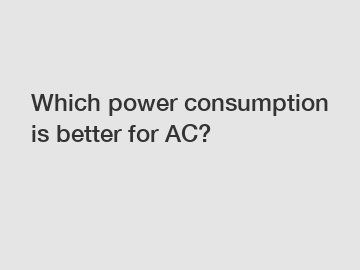Which power consumption is better for AC?
When it comes to choosing an air conditioner, there are a lot of factors to consider. One of the most important factors to take into account is power consumption. Not only does power consumption affect your electricity bill, but it also has an impact on the environment. In this blog post, we will discuss which power consumption is better for AC units and how you can make the most energy-efficient choice for your home.
First, let's talk about the two main types of AC units: inverter and non-inverter. Non-inverter air conditioners work by turning the compressor on and off to regulate the temperature in a room. This means that the compressor is constantly cycling on and off, which can lead to increased energy consumption. On the other hand, inverter air conditioners use a variable-speed compressor that adjusts its speed based on the cooling needs of the room. This results in more precise temperature control and lower energy consumption.
In general, inverter air conditioners are more energy-efficient than non-inverter units. This is because the variable-speed compressor in inverter ACs consumes less power when compared to the on-off compressor in non-inverter ACs. Inverter units can also cool a room more quickly and maintain a more consistent temperature, which can lead to further energy savings. Additionally, inverter air conditioners are generally quieter and have a longer lifespan than non-inverter units.

When considering power consumption, it's important to look at the Energy Efficiency Ratio (EER) of an air conditioner. The EER measures the cooling capacity of an AC unit relative to its power consumption. A higher EER rating indicates a more energy-efficient appliance. Inverter air conditioners typically have a higher EER than non-inverter units, making them a more environmentally-friendly choice.
In addition to choosing an inverter air conditioner, there are other steps you can take to reduce power consumption and make your home more energy-efficient. One simple way to save energy is by setting your thermostat to a higher temperature during the day when you are not at home or at night when you are sleeping. This can help reduce the workload on your AC unit and lower your electricity bill.
You can also improve the efficiency of your air conditioner by regularly cleaning or replacing the air filters. Dirty filters can restrict airflow and make your AC work harder to cool your home, leading to higher power consumption. By keeping your filters clean, you can ensure that your air conditioner operates at its optimal efficiency.
Another way to reduce power consumption is to properly insulate your home. Insulation helps keep cool air inside during the summer months and prevents hot air from entering your home, reducing the workload on your air conditioner. By sealing drafts, installing weather-stripping, and adding insulation to your walls and attic, you can make your home more energy-efficient and lower your power consumption.
In conclusion, when it comes to power consumption for air conditioning, inverter units are the better choice for energy efficiency. Inverter air conditioners use a variable-speed compressor that consumes less power and provides more precise temperature control than non-inverter units. By choosing an inverter air conditioner and implementing energy-saving practices in your home, you can reduce power consumption, lower your electricity bill, and help protect the environment. So, next time you are in the market for a new AC unit, be sure to consider the power consumption and choose the most energy-efficient option for your home.
The company is the world’s best TN Fuel Gas Meter Panel, TN Fuel Gas Meter Panel, gas meter screens supplier. We are your one-stop shop for all needs. Our staff are highly-specialized and will help you find the product you need.
152
0
0


Comments
All Comments (0)